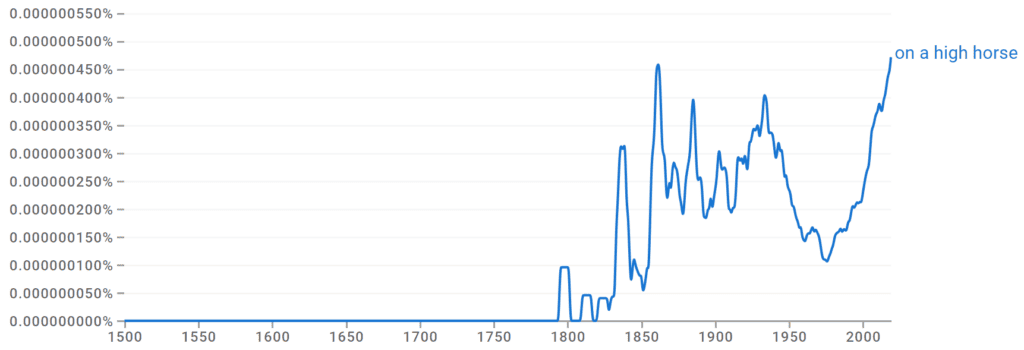On a high horse means someone’s acting arrogantly or superciliously, believing they’re superior to everyone else. Originating from days of old, where the height of someone’s horse signified their rank and stature, this idiom today tells a tale of arrogance.
Idioms, like this little gem, sometimes mean something other than what they seem at face value. Instead, they’re non-iteral phrases we use to better illustrate our thoughts and ideas.
Want to learn more about this idiom? I’ll explain its deeper meaning, share its origin story, and show you how to properly use it in a sentence with fun examples.
High Horse Idiom Meaning

Being on a high horse means having an inflated sense of self-importance or superiority. When someone says, “Get off your high horse,” they’re not asking you to dismount from a literal steed. They’re urging you to stop being so condescending or self-righteous.
I can think of dozens of instances in the publishing world where this idiom could be thrown at people. Agents, editors, and more experienced authors sometimes trot around on high horses, forgetting that indies and aspiring talents are watching their behavior.
Different Versions to Consider
The phrase has trotted through history, adapting and evolving. Here are a few variants and what they mean.
- Ride the high horse: It means to be actively pompous.
- Get off your high horse: It means to stop being pompous and arrogant.
- Up on your high horse: It indicates pointing out someone as pompous.
The core idea remains about superiority and arrogance, but the nuance can shift depending on the phrase’s structure and context.
High Horse Idiom Origin

The term high horse dates back to the 14th century, a time when horses were the primary mode of transportation. Historically, military leaders and knights rode taller horses as a sign of rank, authority, and the practical advantage of being elevated above foot soldiers.
Metaphorically, the phrase evolved during the 18th century when individuals on high horses were seen as looking down upon others from a position of arrogance. This figurative usage reflected the idea of someone holding themselves superior to others, which is the essence of the idiom today.
High Horse Synonyms
- Pompous
- Self-righteous
- Conceited
- Arrogant
- Superior
Examples of High Horse in a Sentence

- Ever since Ted got that ridiculous promotion, he’s been on his high horse.
- “Get off your high horse and listen to what others say,” Emily retorted.
- I wish my boomer father would come down from his high horse and see reality for a change.
- When Maggie realized her mistake, she climbed down from her high horse and apologized.
- “You might want to dismount that high horse before giving unsolicited advice,” Mark noted wryly.
- Being up on your high horse won’t earn you any friends here. We’re all about being real and kind.
Dismounting From the High Horse
In this guide, we’ve explored the idiom high horse, its origins in medieval horse riding, and its modern usage to call out arrogance. It’s a reminder to stay humble and avoid condescension.
The idiom high horse is yet another testament to the malleability of language, painting vivid pictures with words. Now that you know everything about this idiom, gallop over to my other guides that break down idioms!
